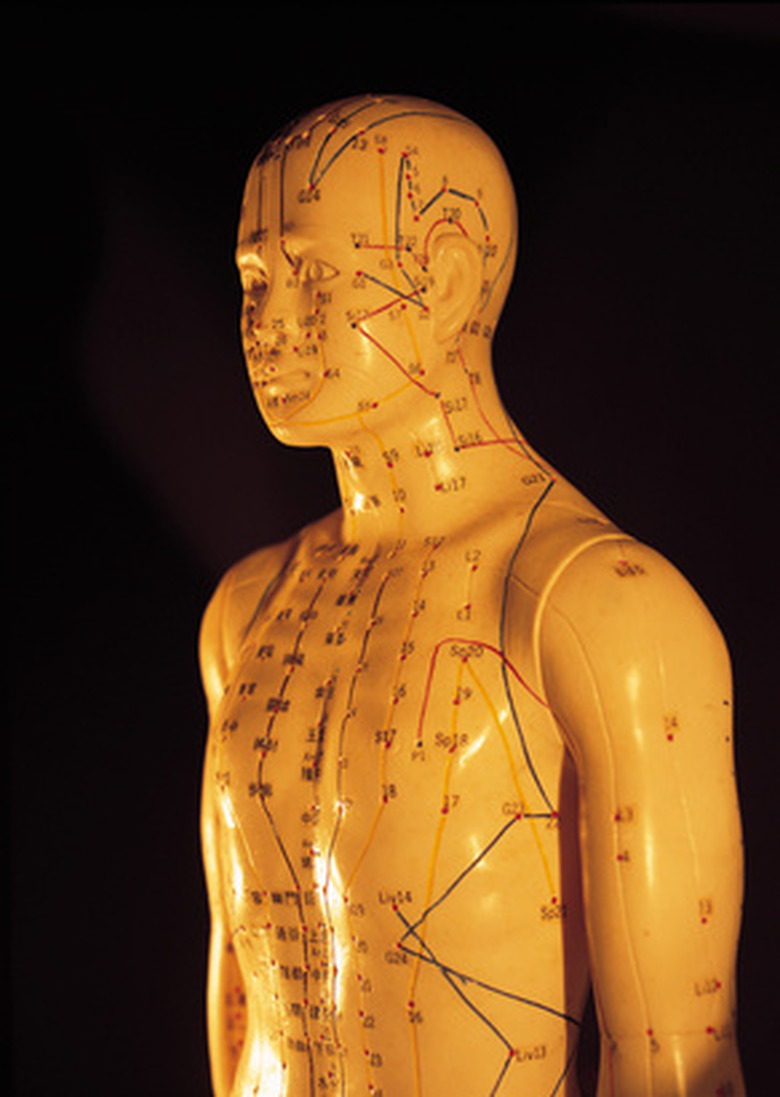What Are The Functions Of TSH?
The hormones secreted by the thyroid gland play a role in metabolism, which affects the rate at which key body systems run. The function of the thyroid gland is triggered by the pituitary gland in the brain. Thyroid stimulating hormone function controls the release of thyroid gland hormones.
TL;DR (Too Long; Didn't Read)
TSH is secreted by the pituitary gland and stimulates the thyroid gland to release thyroxine (T4) when the level of T4 in the blood is low.
Hormones of the Thyroid Gland
Hormones of the Thyroid Gland
The thyroid gland is located in the neck and lies across the trachea, or windpipe. This butterfly-shaped gland secretes two hormones that influence metabolic functions in the body including heart rate, basal body temperature, respiration and digestion. These systems speed up or slow down based on the amount of thyroid hormones that are secreted.
The main hormone the thyroid gland secretes is thyroxine, known as T4 because each molecule contains four iodine atoms. The thyroid also secretes a small amount of triiodothyronine, or T3, which contains three iodine atoms per molecule. Thyroxine is also converted into T3 in specific tissues such as the liver and brain. Thyroxine is the more active and prevalent of the two hormones.
TSH Hormone Function
TSH
Hormone Function
The function of the thyroid gland is determined, in part, by its relationship with the pituitary gland. Located on the underside, or posterior, of the brain and attached to the hypothalamus, this "master gland" controls the function of several glands – including the thyroid – and also secretes certain hormones directly.
The pituitary gland detects the amount of T4 in the blood stream and produces a hormone that sends a signal to the thyroid gland. This signal is in the form of thyroid stimulating hormone (TSH). As its name indicates, TSH stimulates the thyroid to produce and secrete more T4. When the level of T4 in the blood decreases, the pituitary gland secretes TSH, which triggers the thyroid gland to increase production of T4.
A feedback loop exists between the two glands as hormone levels rise and fall in the blood. When the thyroid gland secretes T4, the pituitary gland reacts to the amount of hormone in the blood stream. If the level of T4 is high, the pituitary gland does not secrete TSH. A low level of T4 in the blood prompts the pituitary to secrete TSH, which in turn causes the thyroid to react by increasing the production of T4.
Read more about what causes thyroid failure.
TSH Blood Test
TSH
Blood Test
The level of TSH in the blood can be determined by analyzing a blood sample. Health care providers may request a TSH blood test when patients exhibit a specific set of symptoms that may be indicative of too-high or too-low TSH levels. A TSH level that is out of the normal range causes patients to experience symptoms associated with an increase or decrease in metabolism.
A lower level of T4 in the bloodstream corresponds to a higher level of TSH. If a blood test shows that the TSH level is higher than normal, the patient is diagnosed with hypothyroidism, or underactive thyroid. Hypothyroidism causes some body systems to function at a slower rate. Some symptoms of an underactive thyroid include:
- Fatigue.
- Constipation.
- Weight gain.
- Feeling cold.
- Decreased heart rate.
- Depression.
A higher level of T4 results in a lower level of TSH in the blood. Patients with lower than normal TSH are diagnosed with hyperthyroidism, or overactive thyroid. An overactive thyroid causes an increase in some areas of metabolism and symptoms such as:
- Insomnia.
- Frequent bowel movements.
- Weight loss.
- Overheating.
- Increased heart rate.
- Jitteriness.
Cite This Article
MLA
Mentzer, A.P.. "What Are The Functions Of TSH?" sciencing.com, https://www.sciencing.com/functions-tsh-6361523/. 29 July 2019.
APA
Mentzer, A.P.. (2019, July 29). What Are The Functions Of TSH?. sciencing.com. Retrieved from https://www.sciencing.com/functions-tsh-6361523/
Chicago
Mentzer, A.P.. What Are The Functions Of TSH? last modified August 30, 2022. https://www.sciencing.com/functions-tsh-6361523/
